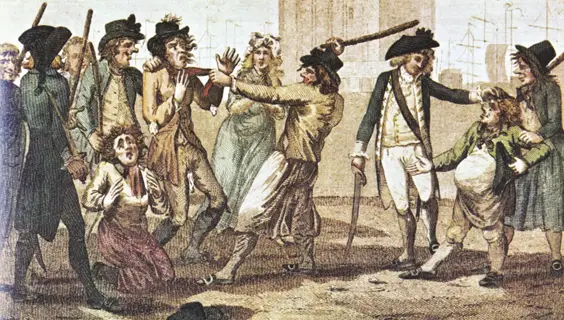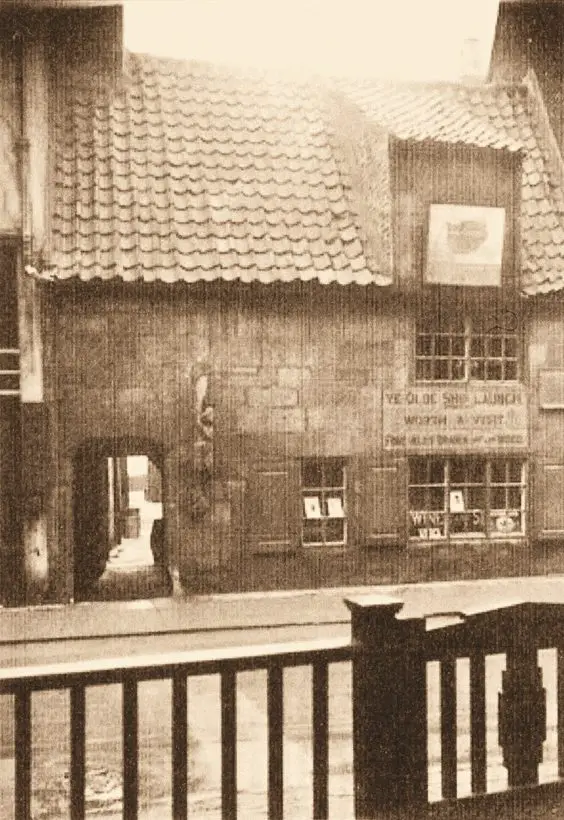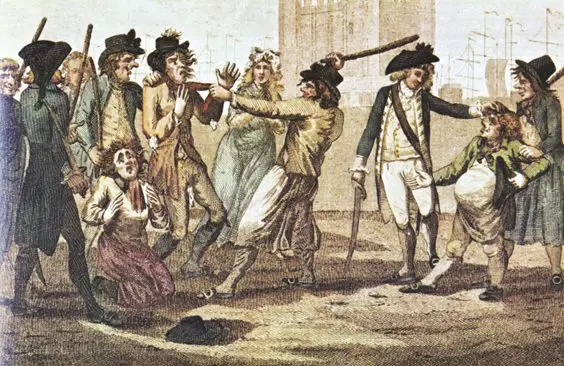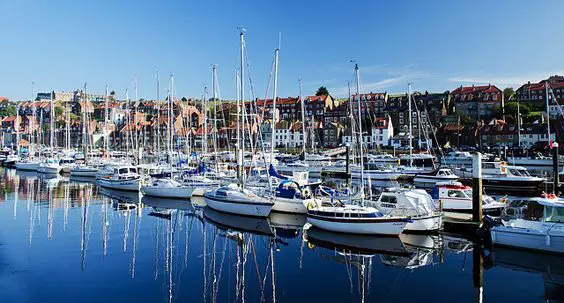The Press Gangs and Smugglers of Whitby – History

By Paul Chrystal
Not all of Whitby’s maritime activities were entirely voluntary, legitimate or legal. Like many other coastal settlements on the north east coast, Whitby made a name for itself as a centre of excellence for the smuggling trade and as a fertile hunting ground for the press gangs.
The prospect of a life at sea under arms in the Royal Navy was less than attractive, so it is no surprise that every effort was made to dodge the king’s shilling (‘prest money’); indeed, enemy fire and shot apart, it is estimated that 50 per cent of the sailors on a given voyage would die of scurvy. And then there was the prospect of injurious or fatal naval combat, along with the additional annoying inconvenience that seamen’s rights were not covered by the Magna Carta and ‘failure to allow oneself to be pressed’ was punishable by hanging.
Nor was your quaffing of a pint in the local quayside tavern always the relaxing and sociable experience it was intended to be. At any point the door might crash open and a mob of recruiting sergeants on a frenzied mission from His Majesty (under the name the Impress Service) would swarm in and manhandle you to the nearest vessel to impress you sufficiently to join the navy and see the world outside Whitby.
Impressment was used by the Royal Navy in wartime, beginning in 1664 and during the eighteenth and early nineteenth centuries, as a means of crewing warships (there was no conscription). Legal sanction for pressing can be traced back to the time of Edward I. People liable to impressment were ‘eligible men of seafaring habits between the ages of 18 and 55 years’. Nonseamen were impressed as well, though not very often. The recruitment figures presented to Parliament for the years 1755–57 list 70,566 men, of whom 33,243 were volunteers (47per cent), 16,953 pressed men (24 per cent), while another 20,370 were also listed as volunteers separately (29 per cent).
“Laid siege”
In the eighteenth century, British desertion rates on naval ships averaged 25 per cent annually, with only a slight difference between volunteers and pressed men. So undermanned had the navy become that in 1795, William Pitt brought two Quota Acts before Parliament. These commanded that each county had to provide a quota of men for enlistment in the Royal Navy according to its population and number of seaports. London had to produce 5,704 men, and Yorkshire, the largest county, were obliged to sign up 1,081. Whitby was an obvious and good source but compliance was not always what it should have been.
The crisis came to a head four years before the Napoleonic Wars (1799–1815). Officially they were restricted to seizing men who were experienced seamen, but in reality any man fitted the bill, and the age limits between eighteen and fifty-five were likewise disregarded. A famous recruitment incident took place in 1803 when the whaler The Oak sought refuge in Whitby’s harbour from a ferocious storm. Whaleboat crews enjoyed reserved occupation status and were supposedly exempt, but the press gangs overlooked this; despite the screams and clashing of pots and pans from the quayside, the gang laid siege to the entire crew for enforced conscription. In the end, though, the locals caused such a commotion that they managed to spirit away the crew of The Oak through Whitby’s snickelways and yards. If you managed to elude the press gangs you could always indulge in a spot of smukkelling.
Smuggling Show me a fisherman and I will show you a smuggler.
Anonymous eighteenth-century customs collector.
In Britain, wherever there was taxation of consumables there was smuggling, a word derived from the Scandinavian ‘smugle’ or ‘smuggla’ meaning ‘to hide’ or ‘a hiding hole’. The first recorded use in English comes in an official document of 1661: ‘A sort of lewd people called Smuckellors … who make it their trade to steal and defraud His Majesty of His Revenue.’ Smuggling then was not a personal affront to the king, but was extremely crippling to the Exchequer, which was haemorrhaging revenue. Before this smuggling was referred to as ‘frauds’ and we first experience it in the late thirteenth century after the introduction of an eye-watering new tax, or custom, of 40 per cent on wool exports.
“Challenge for the revenue men”
Wool was our staple business then and was largely what made the country rich. The Old Smuggler’s Café of 1401 in Whitby’s Brunswick Street unsurprisingly takes its name from the main use of the pub: it was previously known as ‘The Old Ship Launch Inn’ and it was well known that smugglers would use the pub to deliver their untaxed goods. Just outside the carved wooden figurehead is believed to have once been part of a French smuggling vessel captured in 1830. Well before that the Whitby Times in 1790 reported:
Yesterday se’nnight the Fawn, smuggling luggar, with a thousand ankers of rum, brandy and geneva, to the amount of 6,000 gallons, was taken and sent into Whitby, by the Eagle cutter, Captain George Whitegead, in the service of the revenue of that port; with assistance of the Mermaid, Captain Carr. The Fawn is a fine clinch built vessel of 90 tonnes built at Flushing four months since, mounting six four pounders and six swivels. Her crew consisted of 22 men.
The added suggestion is that there was a secret tunnel that connects from the Old Smuggler’s Café to the Station Hotel, which then led to the harbour, so that the contraband would arrive at the harbour and then transported via the tunnel to one of the two pubs.
Whitby was always a challenge for the revenue men because the quays extended into the town centre and the network of ginnels and backyards facilitated concealment of goods and escape from the authorities. Smuggling was never just man’s work. The women of Whitby were welcomed into the trade as they were often less obtrusive and the revenue men seem to have naively assumed that women would never get involved in such a sordid and illegal business. In reality housewives would go to market wearing loose fitting clothes and return home with their clothes laden with a treasure trove of contraband booty. Mrs Gaskell, who lived in Whitby at the time, wrote in Sylvia’s Lovers:
There was a clever way in which certain Whitby women managed to bring in prohibited goods. In fact, when a woman did give her mind to smuggling, she was full of resources, and tricks, and impudence, and energy more so than any man.
Goods were transported inland on pony trails running from Robin Hood’s Bay to Fylingdales Moor along a route known as the Fish Road or Salt Road. Many Robin Hood’s Bay wives trudged these tracks carrying baskets of fish and smuggled silk around their waist. Reputedly they carried pig bladders full of gin under their petticoats.
“Quayside riot”
One story relating to the impact locally on Whitby smuggling exemplifies both stupidity and arrogance in the protagonist. In 1803 Sir Charles Turner, 2nd Baronet of Kirkleatham Hall, near Redcar, and MP for Hull, had the temerity to proclaim in Whitby that he could acquire a bottle of claret at the ridiculously low price of 1s 6d and could get bottles for his friends at the same knockdown price. The good people of Whitby, not entirely without hypocrisy, condemned the man as a delinquent for his involvement in ‘so infamous a transaction’. Indeed, embarrassment inflicted on the Whitby collector apart, Turner could have been prosecuted on at least two charges relating to the buying of and supplying of smuggled goods. Needless to say, he went scot-free whereas other less privileged people would have felt the full lash of the law.
For example, in 1834 the eight-man crew of the fishing boat La Saint Marie were rumbled in Whitby with brandy and tobacco concealed on board. They were fined £100 each and sent to Northallerton Correction House as they were obviously unable to pay their fines. Dodging the excise officers was never easy, but there was one man, a double agent so to speak, who managed it very well and his secret life went with him to the grave. Captain Harold Hutchinson, of the Guisborough-based Dragoons Guards, became the Whitby area customs officer. After a quayside riot the regiment had been posted to Whitby for three years for the very purpose of suppressing smuggling in the vicinity. However, Captain Hutchinson was not averse to helping himself to contraband that had been seized from smugglers, and then selling it on himself. He made a tidy sum from this and was able to build himself a luxury home in Skinner Street known as ‘Harold Mansion’, a home that he also used as a brothel to satisfy the needs of visiting seamen.
The government calculated that around a phenomenal £4 billion worth of revenue was evaporating with illegal imports of tobacco and alcohol every year. It is estimated that 80 per cent of all tea consumed in England was duty free and on a single smuggling trip 3,000 gallons of spirits could be imported. Gin, in fact, became so cheap that it was used for cleaning windows. Tea was the staple commodity for the smuggler for most of the eighteenth century.
 “Illicit trade”
“Illicit trade”
It is believed that most if not all the inhabitants of Saltburn, Staithes, Runswick Bay and Robin Hood’s Bay were involved in the illicit trade, and Whitby too was not exempt. A labyrinthine network of caves, tunnels and concealed cupboards kept the contraband out of sight in all of these locations. The skippers of the ships and boats earned £250 a run, the sailors and overland porters £5 and the labourers and armed lookouts on the beach one guinea. By 1701 things had deteriorated so much that the Customs Commissioners expanded their staff. John Becket was appointed to Staithes with a salary of £40 a year.
John Brown was sent to Whitby as an additional land waiter to inspect cargoes at unlading, and Thomas Long as boatman to inspect the holds of ships. J. Sedgewick was made surveyor of Robin Hood’s Bay and allowed to charge his horse to expenses. Later that century, the service was expanded again until each small harbour had its officer and boat crews, with riding officers and informers.
Records from the Whitby Customs House for 1728 reveal seizures of 27 gallons of brandy discovered at a house in Goathland on the Moors; 8 gallons of the same at a Skinningrove cottage; 12 gallons of brandy, 6 lbs each of coffee and tea and 8 more gallons of brandy and geneva buried in sand, caves, hedges and hiding holes in various parts of the Moors. Whitby’s greatest day came in January 1777 when Whitby Custom House could boast a haul of 650 gallons of gin, 79 lb of green tea, 200 lb of Bohea tea, 7 gallons of wine, 56 lbs of brown candy and the 44-ton boat in which some of these goods had been found.
The gloss was wiped off a Robin Hood’s Bay haul when the officer, who took 200 casks of brandy and geneva, 150 bags of tea, a chest of blunderbusses, and cartuche boxes for twenty men in an innkeeper’s house during October 1779, had to confess that the booty had previously been snatched by smugglers in a raid on the Hartlepool Customs House. In the next century, after spying a suspicious vessel near Runswick one August Monday, Lieutenant King’s Whitby boat gave chase, and was eventually able to escort into harbour a 23-ton ship yielding 21 tubs of geneva, 7 tubs of brandy, 3 casks tobacco, 2 chests of tea and 28 casks of salt. The four prisoners were fined £100 each by the justices, but being unable to pay, they were incarcerated in York prison.
In 1773 two excise cutters, the Mermaid and the Eagle, were outgunned and chased out of Robin Hood’s Bay by three smuggling vessels, a schooner and two shallops. In 1779 a pitched battle between smugglers and excise men took place in the dock over 200 casks of brandy and geneva and fifteen bags of tea.
Article taken from ‘Whitby at Work’ by Paul Chrystal, published by Amberley Publishing, £14.99 paperback, ISBN: 9781445685151












